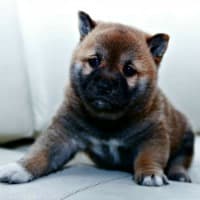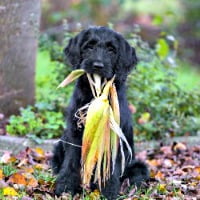About Puppy Personality Testing
All puppies are so adorable to look at that it's easy to make a snap decision based on that 'awww' factor alone.
But temperament is going to play a bigger role in how well your new pup fits into your family and lifestyle than his size, coat color or expression!
Luckily, a few minutes spent on puppy personality testing can give you a better understanding of all of the little ones you're considering (or the one sitting at your feet!).
Testing a puppy usually only takes you about 5 minutes per pup and it's more than worth the time.
I'd suggest 'testing' all the pups in the litter, but if you only want to check up on the ones who's physical appearance tugs at your heart strings that's fine too.
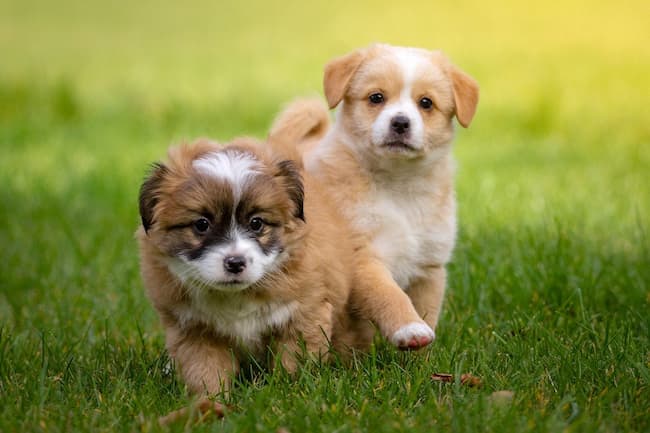
Why Test Your Puppy?
While choosing a puppy based on looks alone can work out just fine, it's not the ideal way to choose a living, breathing little creature who's going to be a member of your family for the next ten years or more!
Puppies are like children, and every single one of them is a unique little 'person' with their own strengths, weaknesses, fears, attitudes and learning style.
If you're looking at purebred puppies, then there will be some 'breed-specific-traits' (ie behaviors that are seen to some degree in all dogs of that breed) as well as individual personality to consider.
Even mixed breed dogs can carry some of these behaviors, especially if they're a hybrid or designer dog breed (these are usually pups produced from two purebred parents from different breeds, such as a Labrador Retriever and a Poodle).
Young puppies will also have been affected by their momma dog's temperament, the conditions they've grown up in, and the care they've had from their breeder.
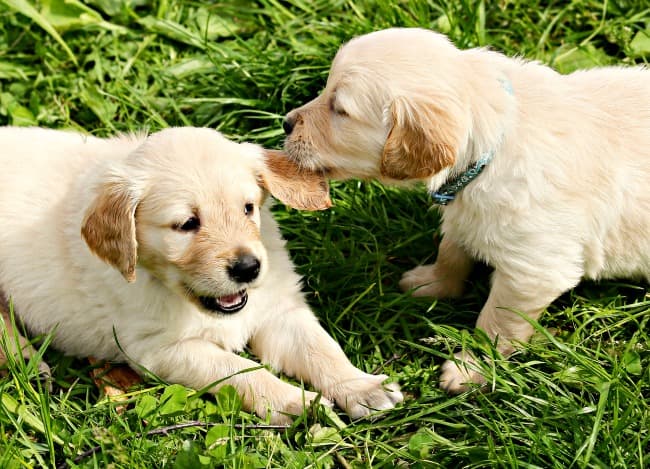
Between 6 and 8 weeks old, any pup will already be showing signs of his individual temperament in the way he behaves with his litter-mates and reacts to other people.
Experts say that the absolutely best time to use one of these puppy 'pop quizzes' is at 7 weeks old, but 7 to 8 weeks is still fine.
Although perhaps not as accurate, even a 9 to 12 week old pup can be evaluated this way as too and you'll still get a good sense of what type of personality he has.
What you can find out using puppy personality testing is general information about a pup's basic 'type'...
- Is he bold and bossy, or quiet and docile?
- Is he nervous and anxious, or friendly and outgoing?
- Is he independent or clingy?
It's important to know these things because they affect how well that little guy might fit into your life and how easy (or not) he is likely to be to train.
But bear in mind these are generalizations and how you raise that little pup will also have a big impact on how he learns and interacts with the world around him.
A friendly happy pup can become fearful and even aggressive if he's mistreated, hurt or ignored.
And a shy, timid pup can grow in confidence and trust if he's raised with love and lots of positive socialization.
The 'nature v nurture' scenario applies to puppies just as well as it applies to children :)
About Puppy Personality Types
Over the years, many dog experts have been devising ways to get a better understanding of the type of dog a pup will most likely grow up to be.
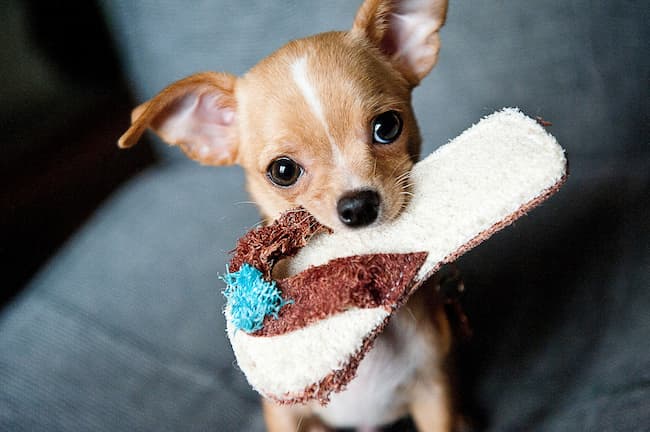
Some of the most recognizable names in this field include William Campbell, Wendy Vollhard and Gail Tamases Fisher.
The Vollhard Puppy Aptitude Test is the one that many professional dog breeders use to evaluate their pups and place them in the homes that are the best fit.
Because I've raised and trained a lot of puppies over my lifetime I totally understand what these tests are looking for, but the amount of information and detail can be a bit overwhelming if you're new at this.
So, let's start at the beginning....
There are six recognizable personality types in puppies.
They're known by different names or terms depending on which test you use, but here's a cheat sheet for you, starting with the 'hardest' personality first and the 'softest' last.....
Dominant/Agressive
- These are the so-called 'alpha' puppies, but on steroids!
- Pushy, bossy, mouthy and vocal.
- Can be rebellious, challenging & aggressive.
- These pups need an experienced, strong-willed owner who is confident and knowledgeable.
- LOTS of training and socialization is needed and professional guidance is a must.
- 'Aggressive' behavior can be a result of a dominant personality or an extremely fearful one.
- If a pup's momma is fearful or aggressive this can be a learned behavior which can be un-learned.
- Not a good choice for a home with other pets, dogs, children or elderly/frail residents.
- This sort of pup does not necessarily make a good guard or protection dog. A professional evaluation is needed.
Dominant/Active
- Pups in this bracket are also 'alphas' but to a lesser degree.
- Pushy, bossy and mouthy.
- Usually high energy, excitable and super confident.
- Tends to get distracted easily or lose focus at times.
- Puppies like this need a firm but loving hand and a lot of patience.
- Need lots of training and socialization and a confident, experienced owner.
- This type of puppy personality also does best with an experienced owner.
- Needs plenty of exercise and an active lifestyle.
- Professional training or work suits them well.
- Best with older children and adults.
- Energy level often too high for elderly or frail owners.
Independent/Strong-Willed
- An independent pup isn't necessarily an 'alpha' but can be inclined to be bossy.
- Confident and self-motivated.
- Can be stubborn and 'march to his own drum'!
- Needs consistent, patient training, lots of practice and tons of praise when successful.
- May be less affectionate than other personality types. Not a cuddler!
- Not clingy or prone to separation anxiety.
- Needs lots of exercise, training, socialization and a 'job' to do or can become destructive or badly behaved.
- Not a good choice for a family with children, elderly relatives.
- Enjoys his own company and can be left during the day while owner works without pining.
Responsive/Affectionate
- A friendly, well-balanced personality.
- Eager to please and quick to learn.
- This type of pup tends to be moderate in most areas - not clingy or too independent, neither overly bold or fearful.
- Basically confident and outgoing.
- Easy to train, and quick to bond with humans.
- Usually accepts other pets.
- A good choice for families with children or elderly/frail relatives.
- Will enjoy obedience classes, agility or other dog/owner activities.
- Needs lots of love and attention. Needs to be with his family whenever possible.
- Good all-around family dog potential!
Calm/Docile
- Usually a submissive pup. Doesn't want to 'be the boss' and prefers to be a follower.
- Has a laid-back approach to life in general.
- Energy and activity level is often below average.
- Tends to be a 'cuddler'. Very affectionate. The ideal lap-dog.
- Can be a bit 'lazy' during lessons but likes to please.. just needs a little extra motivation (or more treats!).
- Gentle, loyal and loving.
- Needs lots of attention and may be lonely or feel separation anxiety if left alone for long periods.
- Usually gets along well with other pets and dogs.
- Good choice for families with small children.
- Best choice for the elderly or frail owner.
Shy/Fearful
- A truly submissive puppy who is timid and shy.
- Can be fearful and anxious, lacks self-confidence.
- Usually very sensitive. Can get scared or have his feelings hurt really easily.
- Needs a kind, patient and understanding owner with lots of love to give.
- Is often afraid of new people, dogs, places or experiences so needs lots of socialization... but at his OWN pace. Slow and easy.
- Training should be gentle, no loud voices or leash corrections. Lots of treats and praise.
- Thrives on routine and needs a quiet, calm and loving home.
- Not a good choice for a busy home, or one with several children.
- Does best with an experienced owner.
- If this pup gets really stressed or scared he could nip or bite.
By now you should have some idea of the type of puppy you're looking for, all you need to know is how to find that little guy.
So, I've put together a simplified puppy personality test that's easy to use.
CLICK HERE to jump to that page.
Take it with you when you go to visit that litter and you'll stand a much better chance of coming home with the perfect pup!
Good luck... the fun is about to begin :)
You Might Also Like:
- Home
- Personality Testing
